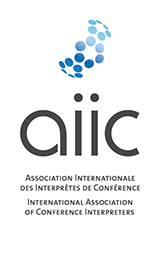AIIC Italy News

The MICE skein of wool
JOINING FORCES WITH HIGH-QUALITY PARTNERS IS THE BEST WAY OF RESURFACING FROM A CRISIS IN BETTER SHAPE THAN YOU WERE WHEN THE BLOW HIT
If there is one lesson I have gleaned from the current pandemic it is that joining forces with high-quality partners is the best way of resurfacing from a crisis in better shape than you were when the blow hit. I like to imagine the MICE (Meeting Incentive Conference and Events) industry like a skein of wool. As an interpreter, you feel you are at the loose end of the skein; you have to carefully weave one word after the other, one thought at a time, and you will be safe. However, you soon realize that at the other loose end of the thread, there is a whole army of professionals: conference organizers, conference room managers, AV providers, and many more. They are as involved in the business as you are, yet you have never engaged in a real conversation with them, nor have you sat at the same table to design a joint strategy to serve our common customers together. That was the aim of the second sweet PRIMS Donut, streamed live on June 2nd on the AIIC social media channels. Unravelling the skein together
Three panelists plus the voice of the AIIC PRIMS - a team of highly committed and professional people I have the honor of coordinating - met for a public online session, which was part of the AIIC Donut series. The panel set off to explore the future of the conference industry and identify the new pillars that will underpin the sector after what the Economist recently described as the COVID AD age, where AD stands for After Domestication, i.e. life in front of a home-based laptop.
The ninety-minute conversation was rich in ideas and fresh insights. Still, three topics that are crucial for the long-term survival of the interpreting profession emerged: sustainability, quality, and global diversity.
Global diversity
The new world of conferencing and meeting that Danielle Ward, founder of re/ward events, introduced is a world where new paths to action should be explored, where things should not go back to where they stood, simply because they were not working. What Danielle envisages is, among other things, conferences and events that give voice to a plurality of actors in order to reach out to more people. Newly developed technologies are easing the path, but the journey must be planned carefully. She talks about global diversity or, in other words, cultural pluralism.
The highway to cultural diversity
As interpreters, we know that there is only one straight highway that leads to cultural diversity: multilingualism. Several theories have described the link between languages and thoughts. Is our way of thinking determined by the language we speak? Do we see the world differently depending on the language we learned in our early childhood? Among other scholars, Lera Boroditsky , assistant professor of psychology and neuroscience at Stanford University, went deep into this fascinating debate. She explains that when you are learning a new language, you are not merely learning a new way of talking, you are also inadvertently learning a new way of thinking. Guy Deutscher, the author of Through the Language Glass and The Unfolding of Language , echoes this opinion. In other words, if players in the MICE industry aim at reaching a broader audience, they should make sure that everyone speaks with their authentic voice. To put it differently, Global English (or Globish) is not enough for in-depth communication.
Quality over quantity
Striving for quality is yet another way of achieving the sustainability endpoint as advocated by Danielle, an opinion also shared by Jessie States, Director of the MPI Academy, who, among other things, touched upon the concept of delegates' wellness.
As we are fast approaching the new area of pods and virtual studios, Jessie suggests considering what she describes the delegates' fatigue, and their unwillingness to stay tuned-in for long. A lost opportunity to fully extract value from the delegates' virtual attendance. It's a phenomenon we could define as the attendees' cognitive overload. Figures reported by Michael Piddock, CEO at Glisser, describe an 80-90% registration-to-attendance conversion rate but an equally high drop-out rate after being online for a few minutes. The trend could be explained by the increased cognitive fatigue non-native speakers feel when attending a virtual meeting. As a participant at an in-person session, part of the content travels via non-linguistic cues: on-screen slides, the reaction of fellow attendees to puns, and the speakers' odd remarks that give sense to the overall picture. When these cues are not accessible, for example, in a virtual meeting, conference-goers whose mother tongue is different from the official language of the conference will find it hard to stay tuned-in for an extended period and they will simply sign off. In a recent article, the Economist clearly described the reasons behind the draining effect of virtual conversations. The linguistic barrier is an additional burden weighing on the shoulders of the professional events organisers’ audience.
The economic value of simultaneous interpretation
Martin Fullard, editor of Conference News, Mash Media, who chaired the lively discussion, suggested MICE organizers should start considering the provision of simultaneous interpretation as a way to increase the level of participation and engagement of non-mother-tongue attendees, including in a hybrid conference setting.
More engagement means more value, as described by a survey published a few years ago. The survey points out that websites whose content is available in the language of the target customer have much higher purchasing rates as opposed to websites in English only. The line of reasoning could arguably be the same in the conference industry.
The sustainable fruits and vegetable basket of AIIC interpreters
There is no denying that wildlife has regained control of the planet during the COVID pandemic. Wild animals gracefully sprint across the quiet streets of our once clogged and congested cities, and our parks are now abundant with beautiful motley flowers. For sure, we want to keep the planet as pristine as possible. As AIIC interpreters, we should be proud, among many other things, of being part of a sustainable Association with members scattered across the globe covering any language combination in any event destination. To offer high-quality interpretation at their meetings, MICE professionals don't have to search too far and aggravate the planet's carbon footprint. Their best interpreters are right on their doorstep. After all, #ThatsWhyAIIC.
